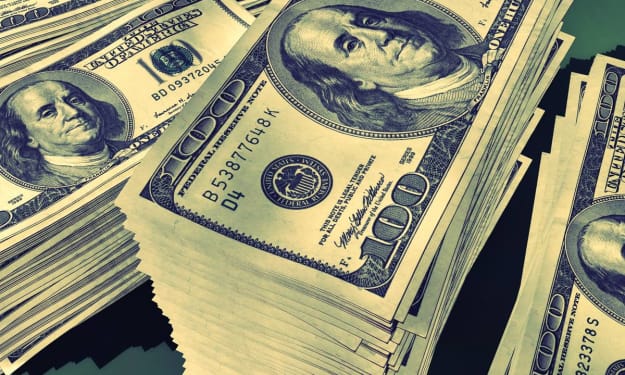Top 11 Books on How to Survive a Recession
Chances are, at some point in your life, you're going to experience a recession or a depression. If you want to feel prepared, try picking up a few books on how to survive a recession.

Let's start with the basics; what's the difference between recession and a depression? I'll start with the more colloquial definition.
A recession is when your neighbor loses their job.
A depression is when you lose your job, too.
While you may have heard this borderline dad joke once or twice before, there's some truth to it. Recessions will impact most people, but depressions impact everyone to some extent.
Regardless, let's get official and formalize things a little.
A recession is a period of temporary economic decline lasting for a minimum of two successive quarters. Conversely, a depression is a long and severe recession in the economy. The level of severity is quite a bit worse, but recessions are trouble no matter what. If you want to prepare, picking up a few books on how to survive a recession might be the help you need.
Jason Schenker, a world-ranked financial forecaster, published his book Recession-Proof in 2016. If you want contemporary information from an expert in the world of finances, this book is a great starting point. This one is entirely focused on the individual, so if it's the ducks of your personal finances that you're looking to get in a row, this is the perfect book to guide you in doing so.
Even Fortune 500 companies listen to advice from Jason Schenker, so if massive companies are paying attention to his tips, individuals can too. If you think you might already be recession-proof, take a good, long look at your finances. How much should you save for an emergency fund? How much should you be saving for retirement? Is another recession on the horizon? This book can help you answer these questions.
House of Debt looks at the hard facts around how the stock market suffered, and how a staggering 8 million jobs were lost between 2007 and 2009. Depending on your age; for example, if you're a millennial like me; you might not remember the Great Recession as keenly as someone who lost their job would. You're aware it happened, you know it was a terrible event in or economic history, but it's hard to understand the pain and stress every single one of those 8 million people who lost their jobs endured. The job market is doing better now, but the recession left marks on many.
For a clear picture of what happened in households for years leading up to the Great Recession, this book paints a clear picture. More importantly, it also gives tips on how you can tighten your personal spending to ensure you'll survive a recession, should one strike again.
"But for them—as for anyone—survival isn't enough. So what began as a last-ditch effort has become a battle cry for something greater. Being human means yearning for more than subsistence. As much as food or shelter, we require hope."—Jessica Bruder
This book covers very unusual cases of people hit hard by recessions and ongoing changes to the job market. Bruder wrote her book about the new-world nomads, people who live in mobile homes and RVs in order to be able to pick up and work anywhere they can find a job. This group is mainly made of transient older adults as a consequence of the Great Recession. The job market changed dramatically and is still changing. It's not easy for anyone to get their finances in order, but it's even tougher for people who can't find stable employment.
When I was a child, while hearing about the recession that was afoot, I spent a lot of time in nerdy, online communities. The fun part of this was that these communities were global—I had friends in Malaysia, Australia, and Canada. They all knew about the recession happening in the United States.
Judis' book takes a look at how a massive recession in the United States has global impact. In particular, he examines how the Great Recession changed American and European politics. While the economic downturn happened here in the states, it had global ramifications.
The title of this book doesn't exactly give you a warm, fuzzy feeling, but sometimes you have to do some disruptive things in order to survive when recession strikes. The audience for this book is primarily businesses—if you have a side hustle that you partially rely on for survival, or if you're a small business owner, it wouldn't hurt to pick up a copy of this book.
Small businesses are typically hit the hardest during tough times, so being extra strategic and adaptive is vital. After all, the sad reality of being an entrepreneur today means that a lot of small businesses will need to take out loans at questionable interest rates. If you have any outstanding debt, it's important to be aware of what's happening at large in the economy.
For a more historical look at the relationship behind the Great Depression, and Great Recession, Professor of Economics and Political Science Barry Eichengreen shares his insights on the parallels and similarities between these two economic crises.
Eichengreen teaches at the University of California, Berkeley. If you haven't heard of the institution, essentially, it means this—he really knows his stuff. To learn about how the two events relate and what caused them, this book covers everything in a clear, concise manner.
In this book, Hetzel questions whether the Great Recession was the fault of the market or the government. If you want to learn about the nitty-gritty of the finances that led to the Great Recession, this book is the perfect choice. Understanding the larger financial factors that cause an economic downturn is key to being prepared for a recession.
The book covers cyclical instability, asset bubbles, credit cycles, and all the various financial fluctuations that landed the United States in another recession. It delves into the more complicated aspects of what brought on the recession, but if you want the whole story and every last detail, this is the book for you.
In the words of my old friend who lived in Malaysia—"When the United States sneezes, the whole world starts to catch a cold." No matter how you feel about politics in America, it's true that we're a big nation and take part in a lot of global commerce.
Moreover, the whole world is moving toward globalization at a steady place. International trade is more common than ever, and while that's great, it means that a recession in one powerful nation can send ripples all across the world's oceans. Adam Tooze's book digs into just that—examining what the financial crisis did to the global economy. This book will give you a good knowledge base as you make a plan to survive a recession.
If you want to get a broad understanding of bubbles, bursts, as well as recessions, and depressions, Weiss' book covers them all. Weiss guides readers through making a stable financial plan for today's economy; the book was recently updated to stay contemporary.
Weiss looks at all the different things that impact a recession—the credit crunch, housing bust, and the decline of the US dollar. These are all things you've probably heard of before, read an article about here and there, or saw something about it on the news, but this book takes a close look at all of those things, and acknowledges the possibility that America could face another recession in the near future.
When I saw the cover of this book, I immediately thought of my grandmother, who grew up during the Great Depression. She was a very young child during that massive economic downturn, but she has clear memories of lining up for rationed food and having very meager meals like ketchup sandwiches.
The recessions we've seen in more recent times weren't nearly as severe as the Great Depression. This ebook is a shorter, essay-length piece that gives timeless tips on making yourself recession-proof. After all, whether you're a homeowner or a renter, here's a sad truth; rent doesn't decrease with a recession. The cost of living only goes up.
Here's one last book to help you plan for a recession—but instead of focusing on interest rates, or the stock market, this book looks at relationships. I know it might sound a little left field, but here's the thing. Financial strain has a massive impact on couples, especially those who live together, or are married. When the rent is due, but the money isn't in the bank, tempers run hot and feelings are easily hurt.
If you want to amass a collection of books on how to survive a recession, it's good to look at every different facet of the experience. You want to make sure your job is protected, yes. You want to work on saving money, absolutely. But you also need to make sure that strain to keep your job and survive a recession doesn't destroy your relationship with the person who means the most to you.
About the Creator
Trish Gilmore
I’m a creative writer, blogger, and IT person from Charm City, Maryland. If you’re not from around here, that means Baltimore. If you see someone in Fells Point pouring over a tiny Windows laptop that’s a bit too old, you might just have spotted me.






Comments
There are no comments for this story
Be the first to respond and start the conversation.